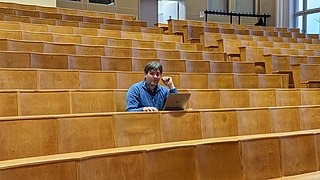Related Research Articles

Bjarne Stroustrup is a Danish computer scientist, most notable for the invention and development of the C++ programming language. Stroustrup served as a visiting professor of computer science at Columbia University in the City of New York beginning in 2014, where he has been a full professor since 2022.
In computing, a compiler is a computer program that translates computer code written in one programming language into another language. The name "compiler" is primarily used for programs that translate source code from a high-level programming language to a low-level programming language to create an executable program.
In computer science, functional programming is a programming paradigm where programs are constructed by applying and composing functions. It is a declarative programming paradigm in which function definitions are trees of expressions that map values to other values, rather than a sequence of imperative statements which update the running state of the program.

An object database or object-oriented database is a database management system in which information is represented in the form of objects as used in object-oriented programming. Object databases are different from relational databases which are table-oriented. A third type, object–relational databases, is a hybrid of both approaches.
Prolog is a logic programming language associated with artificial intelligence and computational linguistics.

Ingres Database is a proprietary SQL relational database management system intended to support large commercial and government applications.
Computer science is the study of the theoretical foundations of information and computation and their implementation and application in computer systems. One well known subject classification system for computer science is the ACM Computing Classification System devised by the Association for Computing Machinery.
William Allan Wulf was an American computer scientist notable for his work in programming languages and compilers.

Matthias Felleisen is a German-American computer science professor and author. He grew up in Germany and immigrated to the US in his twenties. He received his PhD from Indiana University under the direction of Daniel P. Friedman.

The Karlsruhe Institute of Technology is a public research university in Karlsruhe, Germany. The institute is a national research center of the Helmholtz Association.

Michael Ralph Stonebraker is a computer scientist specializing in database systems. Through a series of academic prototypes and commercial startups, Stonebraker's research and products are central to many relational databases. He is also the founder of many database companies, including Ingres Corporation, Illustra, Paradigm4, StreamBase Systems, Tamr, Vertica and VoltDB, and served as chief technical officer of Informix. For his contributions to database research, Stonebraker received the 2014 Turing Award, often described as "the Nobel Prize for computing."
Dorothea Wagner is a German computer scientist, known for her research in graph drawing, route planning, and social network analysis. She heads the Institute of Theoretical Informatics at the Karlsruhe Institute of Technology.
The following is provided as an overview of and topical guide to databases:

Jeffrey Adgate "Jeff" Dean is an American computer scientist and software engineer. Since 2018, he has been the lead of Google AI. He was appointed Google’s chief scientist in 2023 after a reorganization of Google’s AI focused groups.

Martin L. Kersten was a computer scientist with research focus on database architectures, query optimization and their use in scientific databases. He was an architect of the MonetDB system, an open-source column store for data warehouses, online analytical processing (OLAP) and geographic information systems (GIS). He has been (co-) founder of several successful spin-offs of the Centrum Wiskunde & Informatica (CWI).
Hanspeter Mössenböck is an Austrian computer scientist. He is professor of practical computer science and systems software at the Johannes Kepler University Linz and leads the institute of systems software.
Christian S. Jensen is a Danish computer scientist who is a professor at Aalborg University.
Alfons Kemper is a German computer scientist and a full professor for database systems at the Technical University of Munich.

Thomas Neumann is a German computer scientist and full professor for Data Science and Engineering at the Technical University of Munich (TUM).

Jarek Gryz is a computer scientist, data analyst, author, and academic. He is a professor in the Department of Electrical Engineering and Computer Science and a member of the Cognitive Science Program in the Department of Philosophy at York University in Toronto, Canada.
References
- 1 2 3 Moerkotte, Guido (7 March 2013). Ein universelles Konzept zum flexiblen Informationsschutz in und mit Rechensystemen. Springer. ISBN 9783642842788 . Retrieved 2023-08-29.
- 1 2 "research.com" . Retrieved 2023-08-31.
- 1 2 "ResearchGate" . Retrieved 2023-08-31.
- ↑ "Xing" . Retrieved 2023-08-29.
- ↑ "Heuristic and randomized optimization for the join ordering problem" (PDF). Retrieved 2023-08-29.
- ↑ Alfons Kemper, Christoph Kilger, Guido Moerkotte (1991). "Function materialization in object bases". ACM SIGMOD Record. pp. 258–267. doi:10.1145/119995.115833.
{{cite book}}: CS1 maint: multiple names: authors list (link) - ↑ "Teaching" . Retrieved 2023-08-31.
- 1 2 "Building Query Compilers" (PDF). Retrieved 2023-08-31.